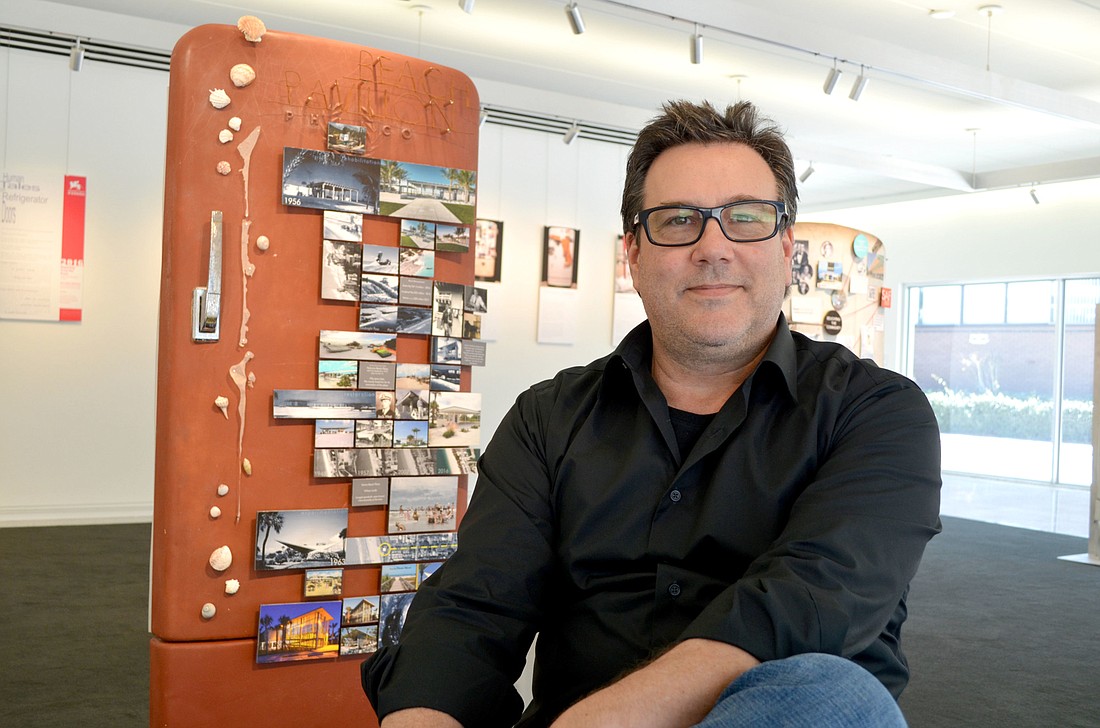- November 23, 2024
-
-
Loading

Loading

Entering someone’s home for the first time, there are two places one can look to quickly learn more about the homeowner.
The first, more obvious place is the bookshelf. A person’s collection of reading materials offers insight into their interests and beliefs one might not otherwise glean.
The second place is less obvious, but equally insightful: the refrigerator door.
It’s here people display some of the mementos and keepsakes closest to their hearts. Throughout American history, save-the-dates, baby photos, portraits of ancestors and countless art projects and aced history tests have adorned the central appliance in a home’s most high-traffic area.
This was the idea behind “Human Tales on Refrigerator Doors,” a collaborative exhibit by Sweet-Sparkman Architects, UF CityLab Sarasota and Center for Architecture Sarasota.
Recently returned from its debut at the annual Venice Biennale of Architecture in Venice, Italy, the installation will be on display through April 28 at Center for Architecture Sarasota.
Following their 2012 participation in the Biennale, a showcase event for architects and designers, Todd Sweet and Jerry Sparkman were invited to participate again in 2016. Last year’s theme challenged participants to tell stories sharing how architecture impacts local communities.
Karl Bernhard, who works at the architecture firm, worked in New Orleans during Hurricane Katrina. In their brainstorming sessions last spring, Bernhard spoke about how when his family home was flooded, one of the most important things to save was their photo albums.
“This idea emerged about living in a precarious environment, which Florida is as well,” says Sparkman. “If you lost everything, what would be the most important things to hold onto? It’s those meaningful personal mementos and keepsakes. And where do you often find those things? On a refrigerator door, behind a magnet.”
The form of expression, which Sparkman calls a distinct part of American storytelling, became the focus of the exhibit. To bring the concept to life, Sweet-Sparkman teamed up with master’s students and instructors from the UF CityLab program, as well as two Ringling College of Art and Design alumni.
“It was an exciting invitation,” says Martin Gold, UF CityLab director. “I love the idea of people creating permanence in an environment of impermanence and the role architecture plays in that. Some of the most compelling images from Hurricane Katrina are the ones that show a house that’s been destroyed, and all you can recognize in the pile of debris is something like a refrigerator. Refrigerator doors are where we tell the stories of our lives.”
To tie the theme to America’s history, they decided to use vintage refrigerator doors. Scouring Craigslist, team members found seven doors they thought would make perfect canvases. They then developed seven American stories they hoped to tell, especially ones with connections to Florida.
Some are literal, while others tackle the subject matter more abstractly. Todd Sweet’s door, “Gimme Shelter,” features a series of miniature orange magnets arranged in the shape of the state of Florida. Monopoly pieces pinpoint locations of some of the state’s most sustainable projects, ranked LEED gold and platinum. Standing in contrast, several black oranges represent areas affected by the 2010 BP oil spill, depicted below in a mirrored Silly Putty imprint of a headline. Bent metal coils symbolize hurricanes.
“Metamorphose,” Bernhard’s door, reflects his experience in New Orleans. On a bright red-and-white International Harvester refrigerator door, he affixed fragmented pieces of drywall with family photos attached.
After developing the rough concepts, the team shipped the doors to Venice, Italy, where it assembled them for the first time.
“It’s really gratifying to take these stories out of context,” says Sparkman. “You appreciate it even more. Looking at them locally, they’re very familiar; you have reference points. But seeing actual vintage American refrigerator doors telling American stories in Italy, it makes it that much more special.”
Now, the doors have returned to Sarasota, where they’ll remain on display through April 28 at Center for Architecture Sarasota.
On April 18, CFAS will host “Tales from the Biennale,” a roundtable discussion with Martin Gold, Jerry Sparkman, Todd Sweet and students Olivia Ellsworth, Chris Fadely and Karl Bernhard.
“I have to say,” says Gold, “the whole experience was kind of magical. Venice was a whirlwind, but seeing them displayed here in Sarasota is rewarding in its own way. I hope people have the same kind of aha moment we did. At first thought, refrigerator doors, storytelling and architecture don’t seem to have much in common. But it’s something universal — anyone can relate to it.”